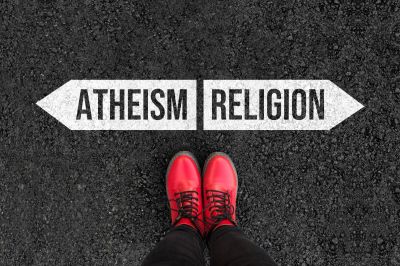Atheism’s obsession with God: Is it ‘cultural theism’?

The amount of time that atheists dedicate to God is a bewildering paradox. They write massive books. They are constantly appearing on podcasts, video blogs, and platforms to discuss God. This obsession seems unjustifiable. How can so much time be spent denying a being that doesn’t exist? Couldn’t that precious time be utilized for solving humanitarian crises?
In 2006, an atheist published a lengthy book claiming that God is a delusion, with an arrogant comment that a religious believer who read it would become an atheist. Then in 2019, he wrote a copious guide on how to outgrow God. If God was already established as a delusion, why waste time instructing on how to outgrow Him? Perhaps G. K. Chesterton was right, “If there were no God, there would be no atheists.”
The atheist preoccupation with God doesn’t seem to be sensible. The term “atheist” should be replaced by a more befitting term. God remains compelling and so atheism prefers to deny Him at every opportunity because it desires a world without Him. It’s not strictly about science, reason, or evidence (I have argued this point elsewhere).
Thomas Nagel, whom I respect, desired a world without God. He expressed his honest sentiments:
“I want atheism to be true and am made uneasy by the fact that some of the most intelligent and well-informed people I know are religious believers. It isn’t just that I don’t believe in God and, naturally, hope that I am right in my belief. It’s that I hope there is no God! I don’t want there to be a God; I don’t want the universe to be like that.” [1]
This longing might help to explain contemporary atheism’s inordinate fascination with God. In other words, it experiences God as a compulsion that necessitates a reaction. The conflict is more noteworthy than how it’s often caricatured.
Note Michael Shermer who is the editor-in-chief of the magazine, “Skeptic,” and a likeable person. As a teenager in the 70s, he once professed faith in Christ. In 2009, he wrote:
“I have spent my entire adult life thinking about God — 30 plus years cogitating on a being that may or may not even exist. Although I am no longer a believer, I still think about him more than I care to admit. Once I stopped believing in God in the late 1970’s, I thought that the whole issue of God’s existence or non-existence would simply fall by the way side ... And yet for a concatenation of reasons involving both my personal and professional lives, God just won’t go away.” [2]
If a chief skeptic has spent his “entire adult life thinking about God,” I believe it’s likewise for many atheists. “God just won’t go away.” No, God is never going away. So the only way for atheism is to focus on ousting Him. With equal rigor, open-minded skepticism should apply its interrogating skills toward the tenets of atheism, but it prefers not to. God becomes the exclusive object of criticism, and bias restricts a path toward discovering Him.
Another atheist attempted some clever intellectual maneuvering to explain God as a natural phenomenon. In his voluminous book, Daniel Dennett identified “believe in belief in God” among atheists. He wrote:
“People who believe in God are sure that God exists ... because they hold God to be the most wonderful of all things. People who moreover believe in belief in God are sure that belief in God exists (and who could doubt that?) ... It is entirely possible to be an atheist and believe in belief in God. Such a person doesn’t believe in God but nevertheless thinks that believing in God would be a wonderful state of mind to be in, if only that could be arranged.” [3]
For me, these mental gymnastics could even be described as “cultural theism.” That is, God is acknowledged practically by atheism and its pre-determined methodology establishes a culture of denial. Or it’s a “naturalized theism” whereby God must remain within specific atheistic parameters. Regardless, God is inescapably part of atheism’s experience and so the term atheist has evidently become a rigid misnomer.
Nevertheless, atheism often explains the belief in God as nature’s wiring of the mind, with a preposterous anecdote that humanity created Him. If so, how did nature wire some to deny that belief? It’s illogical to equivocate on nature’s wiring and have it both ways. Moreover, how did humankind ever come to a consensus on making up God? The truth is that people concocted these naturalistic ideas of God, and atheism prefers them. It’s convenient, but there remains a pesty existential conflict that seems to haunt atheism. A strictly atheistic worldview is failing in its suppression of God, and that is why “cultural theism” is emerging.
As a Christian, I speak for my faith and its unique Gospel message. Thus I encourage “cultural theism” to open up and consider the real connection to God through Christ, as multitudes have attested throughout the ages. Why not explore inner sentiments about God as emanating from Him? Some atheists reading this are probably thinking, nice try, but what about those who professed Christian faith and turned unbelievers? No person who truly comes to Christ can ever leave Him (John 10:1-18).
By the way, those books I mentioned in the intro were written by Richard Dawkins. He wrote another book in 2009 and dedicated it to Josh Timonen, his former right-hand man. Well, Timonen resigned and has professed faith in Christ. It seems that claiming God as a delusion and teaching how to outgrow Him are personal desires.
[1] The Last Word (Oxford: Oxford University Press, 1997), 130-31. Italics are mine.
[2] ”How to Think About God: Theism, Atheism, and Science,” In 50 Voices of Disbelief: Why we are Atheists, Russell Blackford and Udo Schuklenk, eds. (New York: Wiley-Blackwell, 2009), 65. Italics are mine.
[3] Breaking the Spell: Religion as a Natural Phenomenon (New York: Penguin Group, 2006), 221. Italics are in the text.
Marlon De Blasio is a cultural apologist, Christian writer and author of Discerning Culture. He lives in Toronto with his family. Follow him at MarlonDeBlasio@Twitter



























